Sh2-82, The Little Cocoon Nebula
Click image for full size version
October 23, 2022
This image shows Sh2-82, also catalogued as LBN 29 and sometimes referred to as the Little Cocoon Nebula, in reference to the much more famous Cocoon Nebula. It lies in Sagitta, the Arrow, in a rich part of the Milky Way around 4,000 light years distant. The nebula is an active star-forming region made of two parts: a red emission nebula surrounded by a “halo” of bluish reflection nebula. The emission nebula is glowing red due to hydrogen in this star-forming region. The reflection nebula is shining by reflected starlight, like a mirror. There are many dark pockets of dust and soot throughout the image, blocking out starlight behind it.
Tekkies:
Acquisition, focusing, and control of Paramount MX mount with N.I.N.A., TheSkyX and PHD2. Focus with Optec DirectSync motors and controller. Equipment control with PrimaLuce Labs Eagle 4 Pro computer. All pre-processing and processing in PixInsight. Acquired from my SkyShed in Guelph. Average transparency and seeing. Acquired April 18 to June 23, 2022, mostly under a moon-free sky.
Sky-Watcher Esprit 150 f/7 refractor and QHY600M camera with Optolong UV/IR and 3nm H-alpha filters
43x10m Ha = 7hr10m
128x5m OSC = 10hr40m
StarAlignment was used to align the OSC image to the L master. DynamicCrop was used to crop all the masters identically. DynamicBackgroundExtraction was applied to each master.
Colour
Colour Balance: The RGB image was processed with ColorCalibration.
Linear Noise Reduction: NoiseXterminator was used with settings Amount=0.9 and Detail=0.25
Stretching: HistogramTransformation was applied to make a pleasing yet bright image.
Luminance and Hydrogebn-alpha
Linear Noise Reduction: NoiseXterminator was used with settings Amount=0.9 and Detail=0.25 on each master.
Stretching: HistogramTransformation was applied to each master to make a pleasing yet bright image.
Hydrogen-alpha
Linear Noise Reduction: NoiseXterminator was used with settings Amount=0.9 and Detail=0.25
Stretching: HistogramTransformation was applied to make a pleasing yet bright image.
Combining Luminance, Colour and Ha Images
Luminance addition: LRGBCombination was applied to replace the lightness of the RGB image with the Luminance master.
Star Removal: StarXterminator was used to remove stars from both the LRGB and Ha images.
H-alpha Blending: PixelMath was used to add the starless H-alpha to the starless LRGB image (the target image, $T), using the following expressions for the R, G and B channels:
R: max($T[0], 1.2*Ha)
G: $T[1]
B: iif($T[0]<Ha, $T[2] + 0.06*Ha, $T[2])
Additional Processing
Nonlinear Noise Reduction: NoiseXterminator was used to reduce noise in the background areas of each image with settings Amount=0.9 and Detail=0.25
Contrast Enhancement: LocalHistogramEqualization was applied using an inverted lightness mask to protect the background and select the nebula. Three passes were applied (scale 20, max contrast 1.5, strength 0.5, 1 iteration; scale 50, max contrast 1.5, strength 0.3, 1 iteration; and scale 100, max contrast 1.5, strength 0.47).
Sharpening: MultiscaleMedianTransform was used with the same mask used for Deconvolution to sharpen Layers 1 – 4 with strengths of 0.05, 0.2, 0.15 and 0.075, respectively.
Star Reduction: MorphologicalTransformation was used in Morphological Selection mode to slightly reduce the size of stars in the RGB star-only image.
Star Restoration: The RGB stars were added back into the HaLRGB starless image using straight addition in PixelMath.
Final Steps: Background, nebula and star brightness, contrast and saturation were adjusted in several iterations using CurvesTransformation with masks as required. ICCProfileTransformation (sRGB IEC61966-2.1; Relative Colorimetric with black point compensation) was applied prior to saving as a jpg.

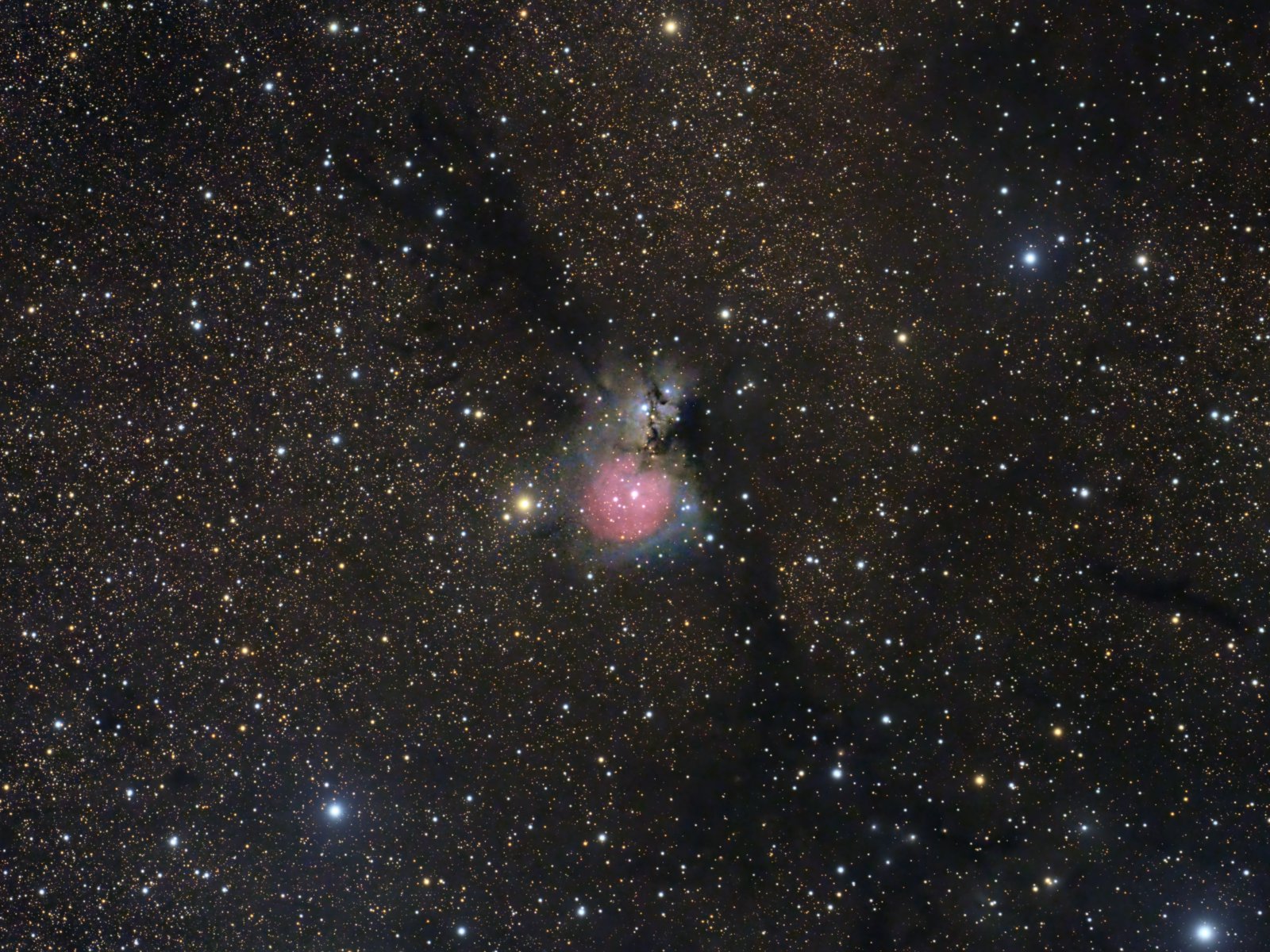
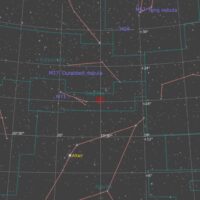
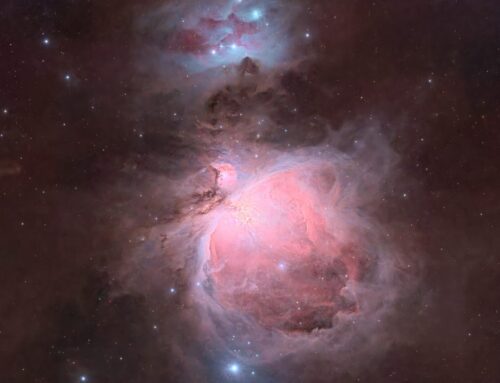
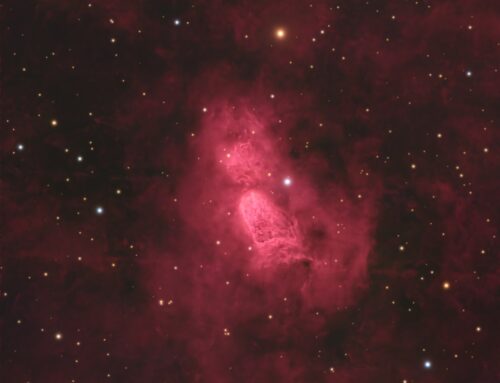
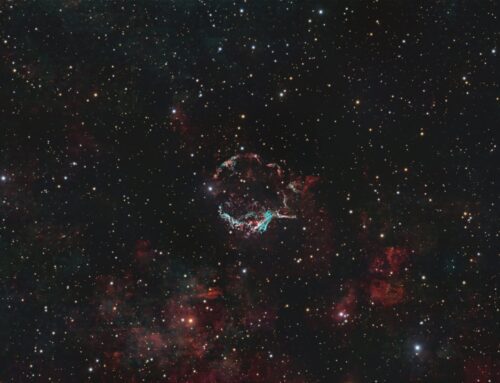
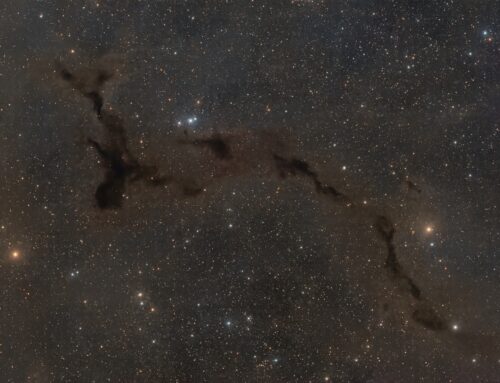
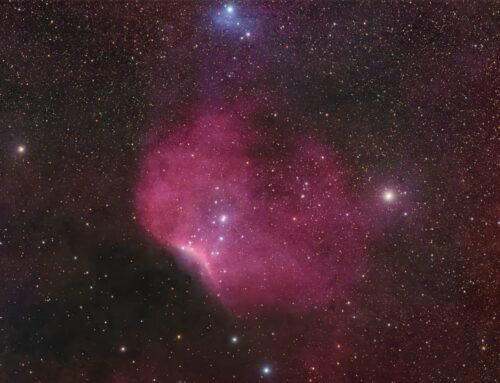
Keep them coming Ron your work is a joy to see.
Fantastic image Ron, perfect in every way.
Thanks for sharing this seldom imaged treasure
Sam Berrada
Montreal
Gorgeous! Like always!
This is really nice!